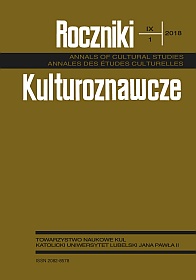Modern War Conflicts in Digital Reality: On the Example of the Memes about the War in Eastern Ukraine
Abstract
Article is focused on the theme of Internet memes from the perspective of memetics. The main purpose of the article is an attempt to recreating the visual-textual narrative of the Ukraine–Russian conflict in social media: Facebook and Vkontakte. The reflections showed that the activity of transmitters allows for the definition two ways of transmitting and multiplying memes. The first method is a single meme expression without developing threads, and the second one consists in creating an extensive sequence of memes. The analysis of the content of the memes made it possible to determine two basic mechanisms for the strengthening images of the parties of the global conflict. The first — strengthening the positive image of Russia (the accreditation role of the inspector in propaganda activities) and the second – a strategy to strengthen the negative image of Ukraine (the role of the opponent's discrediting opponent).
References
Brylska, Karolina, i Tomasz Gackowski, „Krytyka polityczna w memach internetowych – od dekonstrukcji po rekonfigurację”. W Memy czyli życie społeczne w czasach kultury obrazu, red. Tomasz Gackowski, Karolina Brylska i Mariusz Patera, 24–49. Warszawa: Oficyna Wydawnicza ASPRA-JR, 2017.
Blackmore, Susan. Maszyna memowa. Tłum. Norbert Radomski, Poznań: Dom Wydawniczy Rebis, 2002.
Brodie, Richard. Wirus umysłu. Tłum. Piotr Turski, Łódź: TeTa Publishing1996.
Burszta, Wojciech, i Adam Pomieciński. E-folklor – wstęp. Kultura Popularna 2012, 3: 4-5.
Dawkins Richard. Samolubny gen. Tłum. Marek Skoneczny, Warszawa: Prószyński i S-ka 1996.
Fiut, Ignacy Stanisław. „Filozoficzne konsekwencje memetyki”. Racjonalista. Dostęp 25.04.2017. www.racjonalista.pl/kk.php/t,4712.
Goffman, Erwing. „Ramy fotografii”. W Fotospołeczeństwo. Antologia tekstów z socjologii wizualnej, red. Małgorzta Bogunia-Borowska i Piotr Sztompka, 265–304. Kraków: Wydawnictwo Znak, 2012.
Kamińska, Magdalena. Niecne memy. Dwanaście wykładów o kulturze Internetu. Poznań: Galeria Miejska Arsenał, 2011.
Kołowiecki Wiktor, „Memy internetowe jako nowy język Internetu”. Czasopismo Naukowe „Kultura i Historia”. Dostęp 10.07.2017. www.kulturaihistoria.umcs.lublin.pl/archives/3637.
Malewska-Szałygin Anna, „Memy – nowa forma wiedzy potocznej o polityce”. W Memy czyli życie społeczne w czasach kultury obrazu, red. Tomasz Gackowski, Karolina Brylska i Mariusz Patera, 10–23. Warszawa: Oficyna Wydawnicza ASPRA-JR, 2017.
Newman Edward. „The ‘New Wars’ Debate: A Historical Perspective is Needed”. Security Dialogue 35 (2004), 2: 173–189.
Prachnio Radosław. „Memy na internetowych portalach informacyjnych – wzbogacenie przekazu czy brak profesjonalizmu”. W Memy czyli życie społeczne w czasach kultury obrazu, red. Tomasz Gackowski, Karolina Brylska i Mariusz Patera, 137–163. Warszawa: Oficyna Wydawnicza ASPRA-JR, 2017.
Sztompka Piotr. Socjologia wizualna. Fotografia jako metoda badawcza. Warszawa: Wydawnictwo Naukowe PWN, 2005.
Szwed Robert. Framing of the Ukraine — Russia conflict in online and social media. Riga: NATO StratCom COE, 2016.
Walkiewicz Adam. „Czym są memy internetowe? Rozważania z perspektywy memetycznej”. Teksty z Ulicy. Zeszyt memetyczny 2012, 12: 49–69.





